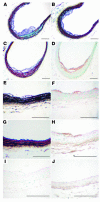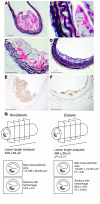Diabetes and diabetes-associated lipid abnormalities have distinct effects on initiation and progression of atherosclerotic lesions
- PMID: 15343384
- PMCID: PMC514580
- DOI: 10.1172/JCI17867
Diabetes and diabetes-associated lipid abnormalities have distinct effects on initiation and progression of atherosclerotic lesions
Abstract
Diabetes in humans accelerates cardiovascular disease caused by atherosclerosis. The relative contributions of hyperglycemia and dyslipidemia to atherosclerosis in patients with diabetes are not clear, largely because there is a lack of suitable animal models. We therefore have developed a transgenic mouse model that closely mimics atherosclerosis in humans with type 1 diabetes by breeding low-density lipoprotein receptor-deficient mice with transgenic mice in which type 1 diabetes can be induced at will. These mice express a viral protein under control of the insulin promoter and, when infected by the virus, develop an autoimmune attack on the insulin-producing beta cells and subsequently develop type 1 diabetes. When these mice are fed a cholesterol-free diet, diabetes, in the absence of associated lipid abnormalities, causes both accelerated lesion initiation and increased arterial macrophage accumulation. When diabetic mice are fed cholesterol-rich diets, on the other hand, they develop severe hypertriglyceridemia and advanced lesions, characterized by extensive intralesional hemorrhage. This progression to advanced lesions is largely dependent on diabetes-induced dyslipidemia, because hyperlipidemic diabetic and nondiabetic mice with similar plasma cholesterol levels show a similar extent of atherosclerosis. Thus, diabetes and diabetes-associated lipid abnormalities have distinct effects on initiation and progression of atherosclerotic lesions.
Figures







Comment in
-
Why does diabetes increase atherosclerosis? I don't know!J Clin Invest. 2004 Sep;114(5):613-5. doi: 10.1172/JCI22826. J Clin Invest. 2004. PMID: 15343377 Free PMC article.
References
-
- Kannel WB, McGee DL. Diabetes and cardiovascular disease: The Framingham study. JAMA. 1979;241:2035–2038. - PubMed
-
- The Diabetes ControlComplications Trial Research Group.1993.The effects of intensive treatment of diabetes on the development and progression of long-term complications of insulin-dependent diabetes mellitus.N. Engl. J. Med.329:977–986. - PubMed
-
- Oldstone MBA, Nerenberg M, Southern P, Price J, Lewicki H. Virus infection triggers insulin-dependent diabetes mellitus in a transgenic model: role of anti-self (virus) immune response. Cell. 1991;65:319–331. - PubMed
-
- Ohashi P, et al. Ablation of tolerance and induction of diabetes by virus infection in viral antigen transgenic mice. Cell. 1991;65:305–310. - PubMed
-
- von Herrath MG, Dockter J, Oldstone MB. How virus induces a rapid or slow onset insulin-dependent diabetes mellitus in a transgenic model. Immunity. 1994;1:231–242. - PubMed
Publication types
MeSH terms
Substances
Grants and funding
- HL62887/HL/NHLBI NIH HHS/United States
- DK02456/DK/NIDDK NIH HHS/United States
- 32HL07820/HL/NHLBI NIH HHS/United States
- AG04342/AG/NIA NIH HHS/United States
- R01 HL062887/HL/NHLBI NIH HHS/United States
- HL076719/HL/NHLBI NIH HHS/United States
- DK51091/DK/NIDDK NIH HHS/United States
- R01 HL076719/HL/NHLBI NIH HHS/United States
- R29 DK051091/DK/NIDDK NIH HHS/United States
- R01 DK051091/DK/NIDDK NIH HHS/United States
- P01 DK002456/DK/NIDDK NIH HHS/United States
- P30 DK035816/DK/NIDDK NIH HHS/United States
- P01 AG004342/AG/NIA NIH HHS/United States
- DK035816/DK/NIDDK NIH HHS/United States
- T32 HL007820/HL/NHLBI NIH HHS/United States
- P30 DK17047/DK/NIDDK NIH HHS/United States
- P30 DK017047/DK/NIDDK NIH HHS/United States
LinkOut - more resources
Full Text Sources
Molecular Biology Databases

